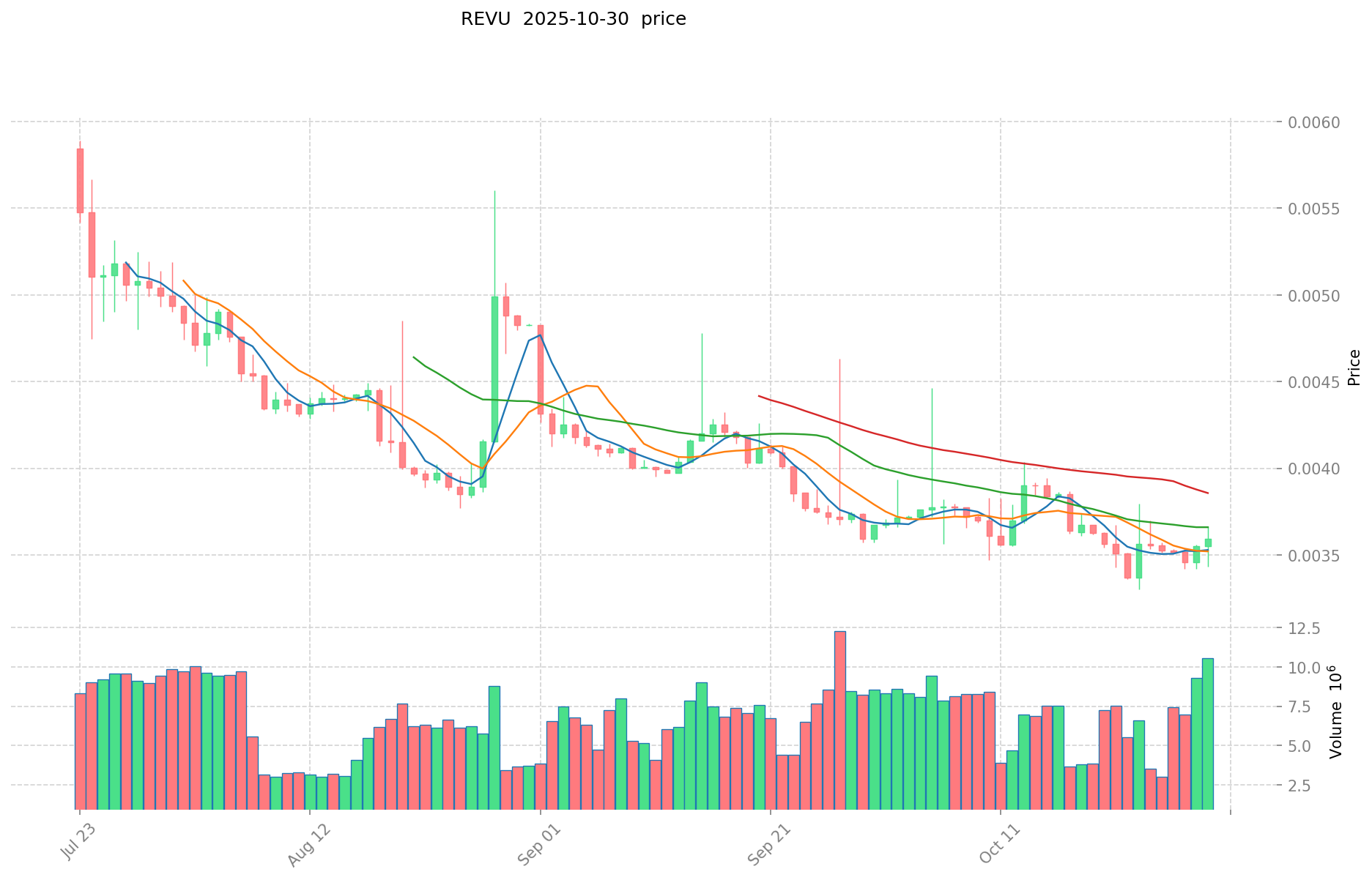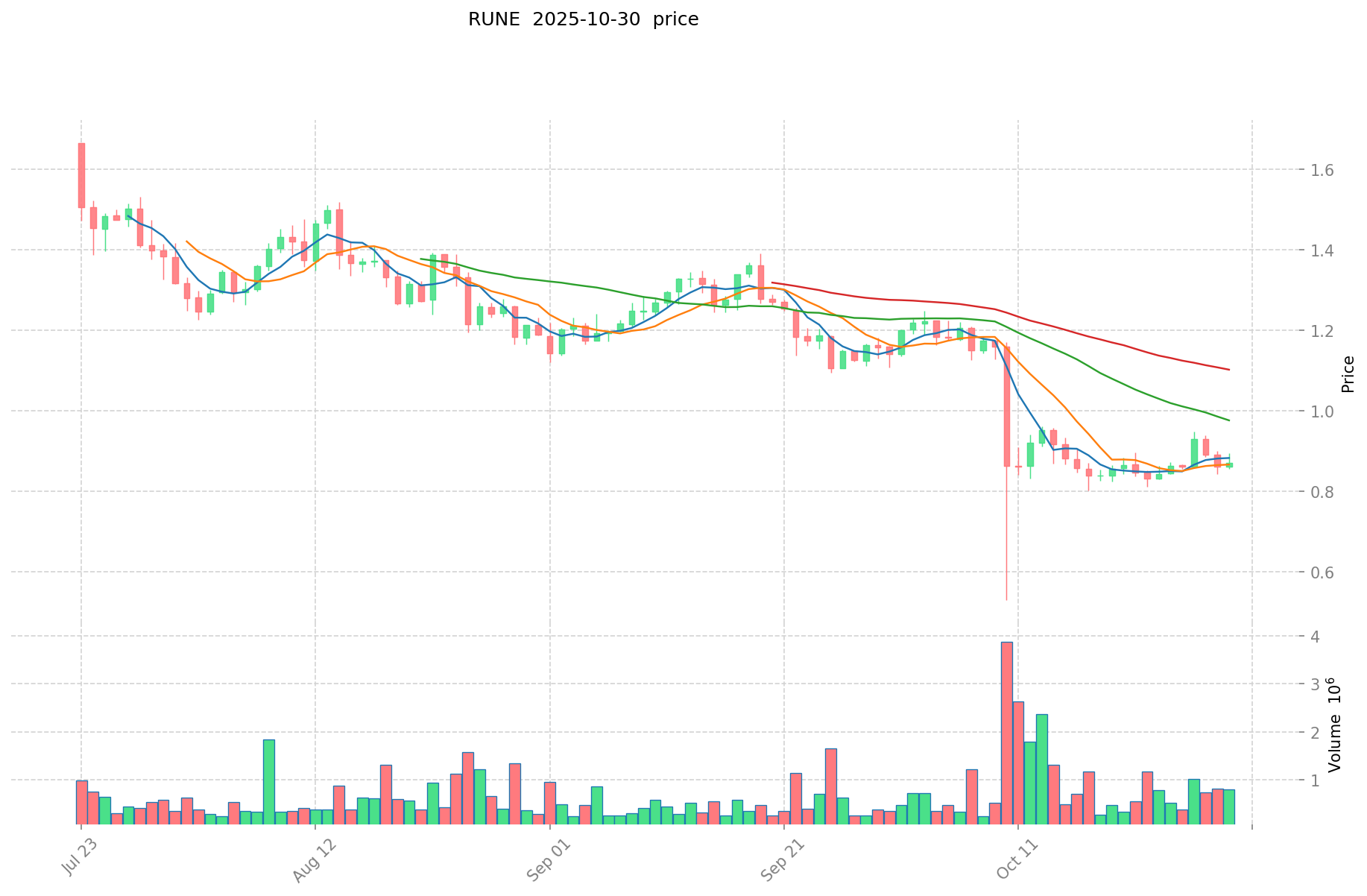REVU vs RUNE: Comparing Two Emerging Blockchain Ecosystems for DeFi Innovation
Introduction: REVU vs RUNE Investment Comparison
In the cryptocurrency market, the comparison between Revuto (REVU) and RUNE (RUNE) has been an unavoidable topic for investors. The two not only show significant differences in market cap ranking, application scenarios, and price performance but also represent different cryptocurrency asset positions.
Revuto (REVU): Since its launch in 2021, it has gained market recognition for its subscription management services on the Cardano blockchain.
RUNE (RUNE): Introduced in 2019, it has been hailed as a key player in cross-chain liquidity and is one of the cryptocurrencies with significant global trading volume and market capitalization.
This article will provide a comprehensive analysis of the investment value comparison between REVU and RUNE, focusing on historical price trends, supply mechanisms, institutional adoption, technological ecosystems, and future predictions, attempting to answer the question that concerns investors the most:
"Which is the better buy right now?"
I. Price History Comparison and Current Market Status
REVU (Coin A) and RUNE (Coin B) Historical Price Trends
- 2022: REVU reached its all-time high of $0.240161, then experienced a significant decline.
- 2021: RUNE hit its all-time high of $20.87 in May, followed by a substantial price correction.
- Comparative analysis: During the recent market cycle, REVU dropped from its peak to a low of $0.00336414, while RUNE fell from its high to around $0.8747.
Current Market Situation (2025-10-30)
- REVU current price: $0.003603
- RUNE current price: $0.8747
- 24-hour trading volume: REVU $37,083.16 vs RUNE $761,505.19
- Market Sentiment Index (Fear & Greed Index): 34 (Fear)
Click to view real-time prices:
- Check REVU current price Market Price
- Check RUNE current price Market Price


II. Core Factors Affecting Investment Value of REVU vs RUNE
Supply Mechanism Comparison (Tokenomics)
- REVU: Market demand driven by game mechanics and engagement levels
- RUNE: Value tied to community participation and platform activity
- 📌 Historical pattern: Supply mechanisms drive cyclical price movements based on user engagement.
Institutional Adoption and Market Applications
- Institutional holdings: Data insufficient to determine institutional preference
- Enterprise adoption: Both tokens primarily function within their respective gaming ecosystems
- Regulatory attitudes: Gaming tokens face varying regulatory scrutiny across jurisdictions
Technical Development and Ecosystem Building
- Gaming mechanics: Token utility directly impacts value through in-game transactions and rewards
- User community: Strong community engagement correlates with price stability
- Ecosystem comparison: User retention and platform growth significantly influence token performance
Macroeconomic Factors and Market Cycles
- Performance during market fluctuations: Gaming tokens show sensitivity to broader market sentiment
- Monetary policy impacts: Interest rates affect risk appetite for gaming-related investments
- Market demand: User growth and retention serve as primary value drivers for both tokens
III. 2025-2030 Price Prediction: REVU vs RUNE
Short-term Prediction (2025)
- REVU: Conservative $0.00209032 - $0.003604 | Optimistic $0.003604 - $0.00497352
- RUNE: Conservative $0.802884 - $0.8727 | Optimistic $0.8727 - $1.117056
Mid-term Prediction (2027)
- REVU may enter a growth phase, with estimated prices ranging from $0.00399497994 to $0.00705286582
- RUNE may enter a bullish market, with estimated prices ranging from $0.9619972821 to $1.6921879902
- Key drivers: Institutional capital inflow, ETF, ecosystem development
Long-term Prediction (2030)
- REVU: Base scenario $0.00571343654111 - $0.008656722031986 | Optimistic scenario $0.008656722031986 - $0.009435827014864
- RUNE: Base scenario $1.470194970690947 - $1.56403720286271 | Optimistic scenario $1.56403720286271 - $2.330415432265437
Disclaimer: The above predictions are based on historical data and market analysis. Cryptocurrency markets are highly volatile and subject to rapid changes. These projections should not be considered as financial advice. Always conduct your own research before making investment decisions.
REVU:
| 年份 | 预测最高价 | 预测平均价格 | 预测最低价 | 涨跌幅 |
|---|---|---|---|---|
| 2025 | 0.00497352 | 0.003604 | 0.00209032 | 0 |
| 2026 | 0.005575388 | 0.00428876 | 0.0031307948 | 19 |
| 2027 | 0.00705286582 | 0.004932074 | 0.00399497994 | 36 |
| 2028 | 0.0079699849803 | 0.00599246991 | 0.0032958584505 | 66 |
| 2029 | 0.010332216618822 | 0.00698122744515 | 0.006283104700635 | 93 |
| 2030 | 0.009435827014864 | 0.008656722031986 | 0.00571343654111 | 140 |
RUNE:
| 年份 | 预测最高价 | 预测平均价格 | 预测最低价 | 涨跌幅 |
|---|---|---|---|---|
| 2025 | 1.117056 | 0.8727 | 0.802884 | 0 |
| 2026 | 1.32318774 | 0.994878 | 0.61682436 | 13 |
| 2027 | 1.6921879902 | 1.15903287 | 0.9619972821 | 32 |
| 2028 | 1.525403160207 | 1.4256104301 | 1.354329908595 | 63 |
| 2029 | 1.65256761057192 | 1.4755067951535 | 1.224670639977405 | 68 |
| 2030 | 2.330415432265437 | 1.56403720286271 | 1.470194970690947 | 79 |
IV. Investment Strategy Comparison: REVU vs RUNE
Long-term vs Short-term Investment Strategies
- REVU: Suitable for investors focused on gaming ecosystems and subscription management services
- RUNE: Suitable for investors interested in cross-chain liquidity and decentralized finance (DeFi)
Risk Management and Asset Allocation
- Conservative investors: REVU: 30% vs RUNE: 70%
- Aggressive investors: REVU: 60% vs RUNE: 40%
- Hedging tools: Stablecoin allocation, options, cross-currency portfolios
V. Potential Risk Comparison
Market Risk
- REVU: High volatility due to smaller market cap and gaming industry fluctuations
- RUNE: Susceptible to broader DeFi market trends and cross-chain adoption rates
Technical Risk
- REVU: Scalability, network stability on the Cardano blockchain
- RUNE: Cross-chain interoperability challenges, security vulnerabilities in multi-chain environments
Regulatory Risk
- Global regulatory policies may impact both tokens differently, with gaming tokens potentially facing scrutiny in certain jurisdictions
VI. Conclusion: Which Is the Better Buy?
📌 Investment Value Summary:
- REVU advantages: Niche market in subscription management, potential for growth in the Cardano ecosystem
- RUNE advantages: Established presence in cross-chain liquidity, larger market cap and trading volume
✅ Investment Advice:
- Novice investors: Consider a balanced approach with a higher allocation to RUNE due to its more established market position
- Experienced investors: Explore opportunities in both tokens, with a focus on REVU for potential higher growth and RUNE for stability
- Institutional investors: Evaluate RUNE for its liquidity and cross-chain capabilities, while monitoring REVU for emerging opportunities in the subscription management space
⚠️ Risk Warning: The cryptocurrency market is highly volatile, and this article does not constitute investment advice. None
VII. FAQ
Q1: What are the main differences between REVU and RUNE? A: REVU is focused on subscription management services on the Cardano blockchain, while RUNE is a key player in cross-chain liquidity. RUNE has a larger market cap and trading volume compared to REVU.
Q2: Which token has shown better historical price performance? A: RUNE has historically shown better price performance, reaching an all-time high of $20.87 in May 2021, compared to REVU's all-time high of $0.240161 in 2022.
Q3: How do the supply mechanisms of REVU and RUNE differ? A: REVU's supply is driven by game mechanics and engagement levels, while RUNE's value is tied to community participation and platform activity.
Q4: What are the key factors affecting the investment value of these tokens? A: Key factors include supply mechanisms, institutional adoption, technical development, ecosystem building, and macroeconomic factors such as market cycles and monetary policy.
Q5: What are the long-term price predictions for REVU and RUNE by 2030? A: For REVU, the base scenario predicts $0.00571343654111 - $0.008656722031986, while for RUNE, the base scenario predicts $1.470194970690947 - $1.56403720286271.
Q6: How should investors allocate their assets between REVU and RUNE? A: Conservative investors might consider allocating 30% to REVU and 70% to RUNE, while aggressive investors might allocate 60% to REVU and 40% to RUNE.
Q7: What are the main risks associated with investing in REVU and RUNE? A: Both tokens face market risks due to volatility, technical risks related to their respective blockchains, and regulatory risks depending on global policies. REVU may have higher volatility due to its smaller market cap.
Share
Content